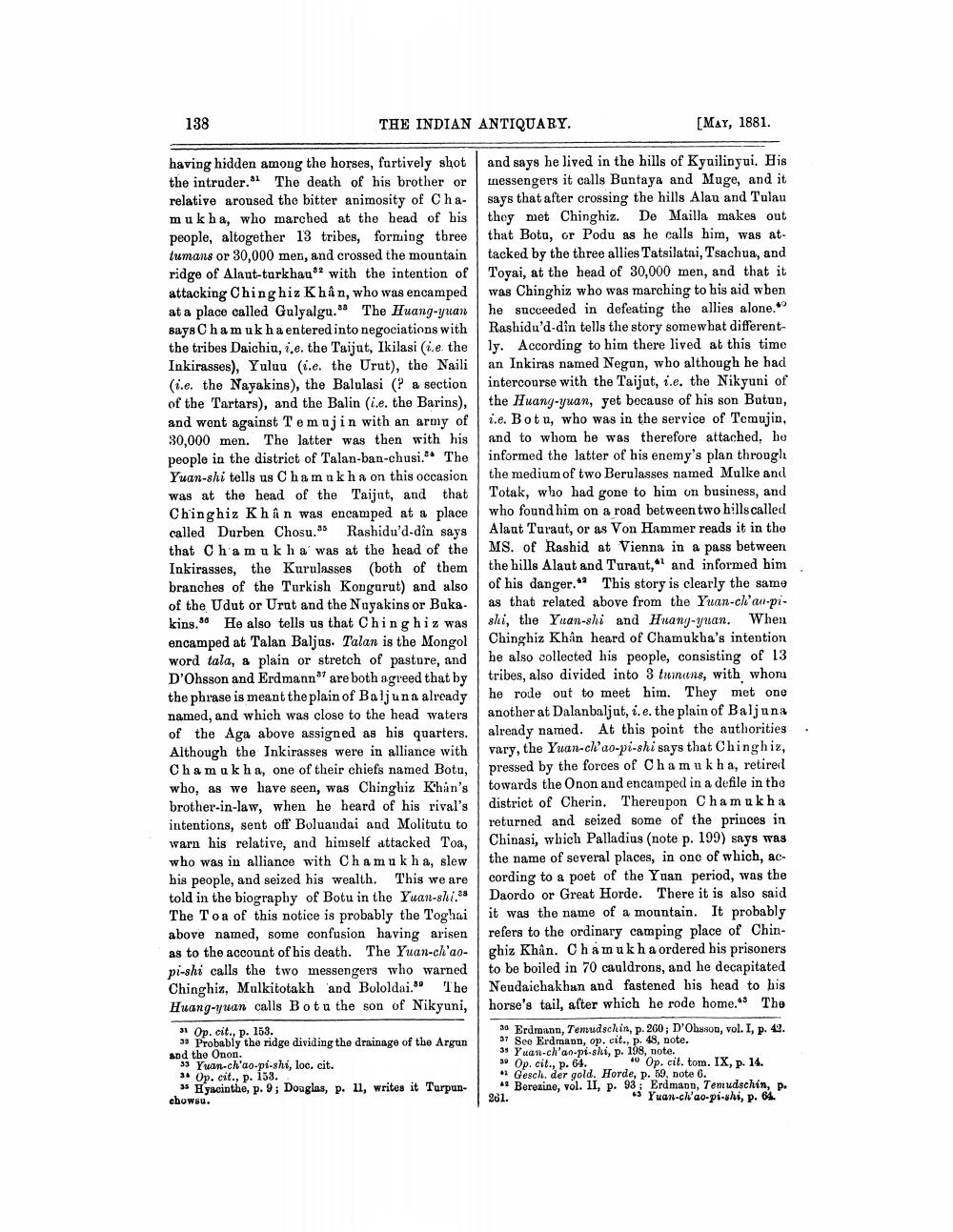________________
138
THE INDIAN ANTIQUABY.
[MAY, 1881.
having hidden among the horses, furtively shot the intruder. The death of his brother or relative aroused the bitter animosity of Cha- mukha, who marched at the head of his people, altogether 13 tribes, fornuing three tumans or 30,000 men, and crossed the mountain ridge of Alaut-turkhauo with the intention of attacking Chinghiz Khân, who was encamped at a place called Gulyalgu.* The Huang-yuan says Chamukha entered into negociations with the tribes Daichiu, i.e. the Taijut, Ikilasi (ie the Inkirasses), Yuluu (i.e. the Urut), the Naili (i.e. the Nayakins), the Balulasi (? a section of the Tartars), and the Balin (i.e. the Barins), and went against Temujin with an army of 30,000 men. The latter was then with his people in the district of Talan-ban-chusi.* The Yuan-shi tells us Chamukha on this occasion was at the head of the Taijnt, and that Chinghiz Khân was encamped at a place called Durben Chosu." Rashidu'd-dîn says that Chamukh a' was at the head of the Inkirasses, the Kurulasses (both of them branches of the Turkish Kongurut) and also of the Udut or Urat and the Nayakins or Bukakins. He also tells us that Chinghiz was encamped at Talan Baljus. Talan is the Mongol word tala, & plain or stretch of pasture, and D'Ohsson and Erdmann are both agreed that by the phrase is meant the plain of Baljuna already named, and which was close to the head waters of the Aga above assigned as his quarters. Although the Inkirasses were in alliance with Chama kha, one of their chiefs named Botu, who, as we have seen, was Chingliz Khan's brother-in-law, when he heard of his rival's intentions, sent off Boluandai and Molitutu to warn his relative, and himself attacked Toa, who was in alliance with Chamukha, slew his people, and seized his wealth. This we are told in the biography of Botu in the Yuan-s/.** The Toa of this notice is probably the Toghai above named, some confusion having arisen as to the account of his death. The Yuan-ch'aopi-shi calls the two messengers who warned Chinghiz, Mulkitotakh and Bololdai." The Huang-yuan calls Botu the son of Nikyuni, » Op. cit., p. 153.
32 Probably the ridge dividing the drainage of the Argun and the Onon.
33 Yuan-ch'ao-pi-shi, loc. cit. 34 Op. cit., p. 153.
» Hyacinthe, p. 9; Douglas, p. ll, writes it Turpunchowsu.
and says he lived in the hills of Kyuilingui. His messengers it calls Buntaya and Muge, and it says that after crossing the hills Alau and Tulau they met Chinghiz. De Mailla makes out that Botu, or Podu as he calls him, was attacked by the three allies Tatsilatai, Tsachua, and Toyai, at the head of 30,000 men, and that it was Chinghiz who was marching to his aid when he succeeded in defeating the allies alone." Rashidu'd-din tells the story somewhat differently. According to him there lived at this time an Inkiras named Negan, who although he had intercourse with the Taijut, i.e. the Nikyuni of the Huang-yuan, yet because of his son Butun, i.e. Botu, who was in the service of Temujin, and to whom he was therefore attached, he informed the latter of his enemy's plan through the medium of two Berulasses named Mulke and Totak, who had gone to him on business, and who found him on a road between two hills called Alaut Turaut, or as Von Hammer reads it in the MS. of Rashid at Vienna in a pass between the hills Alaut and Turaut," and informed him of his danger. This story is clearly the same as that related above from the Yuan-claw.pi. shi, the Yuan-shi and Huany-yuan. When Chinghiz Khan heard of Chamukha's intention be also collected his people, consisting of 13 tribes, also divided into 3 tuinans, with whom he rode out to meet him. They met one another at Dalanbaljat, i.e. the plain of Baljuna already named. At this point the authorities vary, the Yuan-ch'ao-pi-shi says that Chinghiz, pressed by the forces of Chamukha, retired! towards the Onon and encamped in a defile in the district of Cherin. Thereupon Chamukha returned and seized some of the princes in Chinasi, which Palladius (note p. 199) says was the name of several places, in one of which, according to a poet of the Yuan period, was the Daordo or Great Horde. There it is also said it was the name of a mountain. It probably refers to the ordinary camping place of Chinghiz Khân. Chamukh a ordered his prisoners to be boiled in 70 cauldrons, and he decapitated Neudaichakhan and fastened his head to his horse's tail, after which he rode home. The » Erdmann, Temudschin, p. 260; D'Obsson, vol. I, p. 49. 37 See Erdmann, op. cit., p. 48, note. 39 Yuan-ch'an-pi-shi, p. 198, note. » Op. cit., p. 64. "" Op. cit. tom. IX, p. 14. " Gesch, der gold. Horde, p. 59, note 6.
" Berezine, vol. II, p. 93 ; Erdmann, Temudschin, p. 201.
13 Yuan-ch'ao-pi-shi, p. 64.




